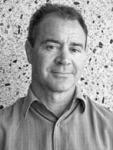Kim Scott is a multi-award winning Indigenous author from Western Australia. He grew up near Albany, in southern Western Australia, then on leaving school completed a Bachelor of Arts Degree and a Graduate Diploma in Education at Murdoch University, in Perth. He initially worked as a secondary school teacher and later turned to writing full-time.
Scott began working on his first novel, the semi-autobiographical True Country (1993), whilst teaching at a remote Aboriginal community in the Kimberley region of Western Australia. Since then he has gained widespread critical acclaim for the way in which his writing explores questions of identity, race and history, and also for his interest in finding ways that Indigenous people might connect their ancient heritage to contemporary life. His friend John Fielder has written that Scott "is an important figure in Australia today because of his creative quest to open up new and different ways of 'being black', and to provide a language for that which is otherwise un-utterable".
In 2000, Scott became the first Indigenous author to win the Miles Franklin Literary Award, with his novel Benang: From the Heart (1999). In 2011 he won both the Miles Franklin and the Australian Literature Society’s Gold Medal with That Deadman Dance (2010). He was a guest speaker at the 2001 Century of Federation Alfred Deakin Lecture Series in Melbourne. He presented at the 2004 Melbourne 'Globalisation and Identities' forum. He has been a member of the Aboriginal and Torres Strait Islander Arts Board of the Australia Council. In 2012 he was made a Fellow of the Australian Academy of the Humanities and also named West Australian of the Year.
Since completing a PhD in Creative Writing at the University of Western Australia in 2009, Scott has been involved with the Curtin Health Innovation Research Institute and also the Wirlomin Noongar Language and Story Project. Scott was appointed Professor of Writing in the School of Media, Culture and Creative Arts of Curtin University in December, 2011. He is a member of The Centre for Culture and Technology (CCAT), leading its Indigenous Culture and Digital Technologies research program.
Scott is the nephew of Hazel Brown, with whom he co-wrote in Kayang and Me.



